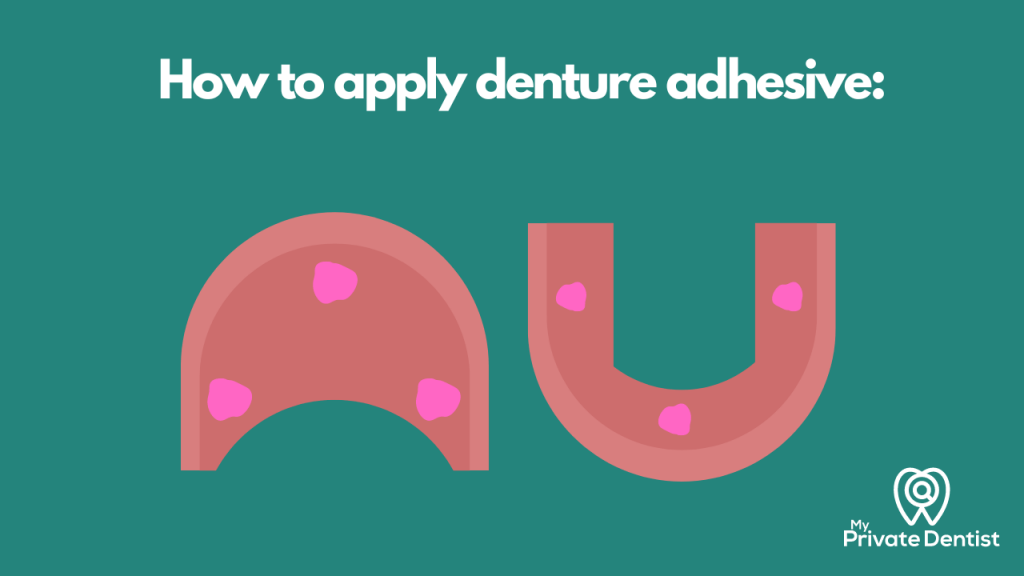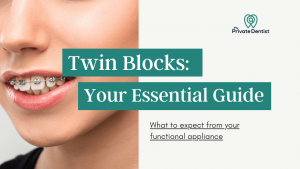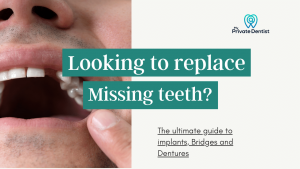As a dentist who has made and fit hundreds of dentures, I know the role a good dental adhesive can play in your experience and confidence in wearing false teeth.
There are many choices available, so the right denture adhesive needs to be picked depending on YOUR individual situation.

It’s important to stress that even the best denture adhesive WILL NOT be useful unless your denture is well made. Your denture needs to be almost right; and then dental adhesive will help make it fit better.
I will go into what makes a good denture, and which ones are destined to fail even with adhesive. The aim is for a well-fitting and functional denture that ensures confidence in eating, smiling, and laughing.
The best denture adhesive available for most cases is the POLIGRIP Denture Adhesive Cream Ultra. I recommend this because it is provides a good hold on the denture, is easy to apply, cost effective and zinc free.
However, there may be options which are better for you. Read on to find out more.
What is denture adhesive?
Denture adhesives can come in many forms; pastes, creams, powder, cushions or strips. They are used to improve the stability and comfort of dentures, and help to form a seal to prevent food debris getting underneath.
The added stability contributes to an increased sense of confidence and satisfaction while wearing dentures.
Will denture adhesive work for me?
When looking online you will find mixed reviews for all these products. The reviews aren’t always useful as individual circumstances can be so varied. For example someone who has a very poorly fitting denture may try the product, and even with the best intentions, it will not work. Other people who have a well fitting denture as a starting point, may rate the product 5 stars.
A 2021 systematic review concluded that denture adhesives can improve denture retention, bite force and masticatory performance of complete denture wearers. (1)
Denture adhesives are particularly good for people with decreased saliva, as it can help improve the seal with soft tissues. They can also help on occasions when you need more stability such as chewing tougher food.
But again, I would like to stress, they will only work well if you have a generally well-fitting denture.
Types of denture Adhesive

Pastes
The most common type of adhesive. The paste is squeezed from a tube onto the denture fit surface with a thin nozzle in a specific pattern. This spreads over the surface when the denture is put in.
Creams
Similar to pastes but have a thinner consistency. They are easy to apply, provide a good hold, but may be messy to remove.
Powders
Consist of particles which mix with saliva to produce a paste which helps to keep dentures in place. Good for keeping food out from under the denture.
Strips/Cushions
Dental adhesive strips are like double sided tape that is placed on the surface of the denture and then sticks to your palate or lower ridge. These can be slimline for strips, or cover the whole surface for cushions.
Reline Materials
Powder and liquid is mixed into a soft material that is then stuck to the denture. Placing your denture in your mouth helps the reline material shape to your ridge altering the fitting surface.
These can be used temporarily if your ridge has changed shape and your dentures don’t fit as well anymore. They are quite difficult to apply, but can work well, and last around 4-6 weeks.
Our Top 6 picks
Best Denture Adhesive Overall – Poligrip Denture Adhesive Cream Ultra
Best Denture Adhesive for Easy Application – Fixodent Extra Hold, Denture Adhesive Powder
Best No-Mess Denture Adhesive – Super Poligrip Comfort Seal Denture Adhesive Strips
Best Denture Adhesive for Sore Gums – Y-Kelin Denture Adhesive Cushion
Best Denture Adhesive for Changing Your Denture Fit – Dentemp Reline-It Denture Reliner
Best Denture Adhesive Overall
Poligrip Denture Adhesive Cream Ultra
Why we recommend this denture adhesive:
Poligrip Ultra is an outstanding adhesive when applied to a well fitting denture. It comes in a small sturdy tube with a thin nozzle, so is really easy to apply. The stability of dentures is much improved, and they stay in place well when eating and speaking. It’s cost effective, with one tube lasting well over a month. Its also zinc-free, and antimicrobial, contributing to your overall oral health.
The minty taste is refreshing, but there is a flavour-free option if you prefer.
In fact, the only downside is that removal is a little messy as it sticks so well to the soft tissues. But overall, its well worth it for the hold you get.
How long does it last? 12 Hours
Best for: Well fitting complete or partial dentures
Best Denture Adhesive for Easy Application
Fixodent Extra Hold, Denture Adhesive Powder
Denture adhesive powders work really well and are recommended by many dentists. This one is very easy to apply, simply wash and dry your denture, and sprinkle a little on the inner fit surface. Definitely worth a try if you really don’t like removing denture paste at night from your gums as its easier to clean off.
It provides suction by filling any spaces between your denture and gums, and prevents food getting under your denture.
Unfortunately, its not always available in shops and supermarkets, so you may need to buy it online.
How long does it last? 12 Hours
Best for: Dentures which require a little more suction.
Best No-Mess Denture Adhesive
Super Poligrip Comfort Seal Denture Adhesive Strips
These strips can be cut to size easily and applied to the denture. They are much less messy and there’s no worry of adhesive oozing out of the sides of the denture. They aren’t quite as strong in holding a denture in place, but still prevent food particles getting in. They cost around 17p a strip, and a box should last you around a month. If you’re using quite a few, you may consider a reline.
How long does it last? 12-16 Hours
Best for: People who struggle to remove paste from dentures and gums.
Best Denture Adhesive for Sore Gums
Y-Kelin Denture Adhesive Cushion
If you have upper and lower complete dentures, which may not fit quite a well as they used to, your gums may have resorbed. In these cases, the cushion pads by Y-Kelin could help your denture feel more comfortable.
These are made from a natural seaweed based compound, which becomes mouldable when placed in water. They can also be cut to size to fit your denture. Cushions are particularly useful for lower complete dentures which are rubbing onto your gums and making them sore.
They are a good short term option, but it may be worth having you dentures professionally relined if they work well for you, otherwise the cost may stack up.
How long does it last? Needs to be replaced daily
Best for: Lower denture where you don’t have a prominent ridge. Older complete dentures.
Best Denture Adhesive For Changing Your Denture Fit
Dentemp Reline-It Denture Reliner
When the inside shape of your denture no longer fits with the shape of your gum, a dental professional may offer a reline. This kit allows you to carry this out yourself at home.
You need to mix the powder and liquid into a thick paste, attach it to the inside surface of your denture, and place your denture into you mouth. This then sets to change the shape of your denture.
When done properly this can work very well. You need to be able to place the denture in accurately, and then carry out some movements that mimic eating and speaking to make sure your denture doesn’t become overextended. There are some videos are available online to help you through the process.
The paste was easy to mix and apply, and sets well. Excess can be cut away with scissors. A reline will make a big difference to many dentures when used properly. The bond to the denture isn’t always great so you need to be careful with your denture once placed.
How long does it last? 4-6 weeks
Best for: Those who have had teeth removed recently, the the gum has changed shape.
A Buying Guide – What makes the right adhesive for you
Below are some factors to take into consideration when buying denture adhesive:
Ingredients
Zinc-Free: Some denture adhesives do contain a small amount of zinc, which can leach into soft tissues. In large quantities can have some potentially harmful side effects such as tingling or numbness, but for most people this won’t make a significant difference. If you’re using denture adhesive daily, you may choose to have a zinc-free adhesive.
Cellulose: This is an ingredient that works well to help stick your denture to the roof of your mouth or lower gums.
Colourant: Some denture adhesive pastes come in a brighter colour so you can easily see where you have applied it, and also helps during removal at night.
Antimicrobial Agents: These could be ethanol or borate based compounds which help to kill bacteria to keep your mouth healthy.
Texture
Generally you should not be able to feel any adhesive once you have it in, but some patients do not like the texture of the powder and paste. They can also be messy and sticky to remove. The strips and cushions are easier to apply and remove.
Flavour
Ideally they should have a neutral taste and odour but some do have a minty flavour to add freshness.
Ease of application
It’s worth trying a few to see which one you have a preference for. Pastes and powders are all easy to apply, although some can be more difficult to remove. Pastes of a brighter colour help you to see where it has been applied, better for the visually impaired.
You may need to cut strips and cushions to size before use.
Cost
If you have a well fitting denture generally then you should only have to use a little adhesive daily. If you’re going through many tubes a month then your denture probably has an issue, and you may need a new one made.
A 40g tube has 40 applications, it will cost you around 10p an application.
Cushions and strips are more expensive. The reline material may have a higher cost initially but if it works well it can last 4-6 weeks.
Who should avoid denture fixative?
You should avoid if:
- You have a new denture, as you need to check how well it fits without adhesive first. You might have a good natural seal between your mouth and the denture.
- You’re adapting to your dentures. Over the first few weeks you may learn to control the denture with your tongue and muscles, meaning you don’t need any adhesive.
- If you denture has fractured into two pieces, adhesive shouldn’t be used to put them together. You can have your denture repaired by a denture laboratory.
- You have excessive bone resorption due to tooth loss.
- If you experience redness, soreness or tingling after using an adhesive you may be allergic to one of the ingredients, you should stop using it and try a different brand.
- If you experience any irritation or discomfort, consult your dentist.
Top Tips on Denture Adhesives
- Start with a small amount of adhesive, and adjust as needed. Using too much can lead to a messy application and may not provide additional benefits.
- For partial dentures (when you still have some of your own teeth) it is best to use paste.
- Don’t overuse adhesive, if your dentures require adhesive to be applied multiple times a day, its best to see a dentist for new dentures.
- Always fill the sink with water when cleaning you dentures, so they don’t break if you drop them.
How to use denture adhesive – step by step
1. Clean Dentures: Use a denture brush and mild soap to remove any debris, food particles, or adhesive residue from previous use. Rinse them well with water.
2. Dry Dentures: Excess moisture can affect the effectiveness of the adhesive.

3. Apply Adhesive: Follow the specific instructions on the product you are using.
- Cream or paste: Squeeze a small amount of adhesive onto the clean, dry denture surface. Start with a thin layer, as using too much can cause oozing.
- Powder: Sprinkle a thin layer of powder evenly over the surface of the dry denture.
- Strips/cushions: Apply the adhesive strips according to the package instructions, ensuring they cover the necessary areas.
4. Insert Dentures: Place the dentures in your mouth, positioning them carefully. Press down gently but firmly to ensure a good fit.
6. Bite and Hold: Bite down and hold the dentures in place for a few moments to allow the adhesive to set. This helps create a secure bond between the dentures and your gums.
7. Clean Excess Adhesive: Wipe away any excess adhesive that may have oozed out around the edges of the dentures. You can use a clean, damp cloth.
8. Daily Cleaning: Remove and clean your dentures daily. Follow the same cleaning routine to remove adhesive residues and maintain oral hygiene.
Potential Dental Issues
It’s crucial not to rely on denture adhesives as a solution for ill-fitting dentures. Doing so can lead to long-term issues such as a flabby ridge, hyperplasia, polyps, gum sores, and ulcers. If you experience any of these problems, consider having your dentures adjusted or remade by a dentist for optimal fit and comfort.
Denture Extensions
Overextension refers to dentures that extend beyond the natural contours of the oral cavity, causing discomfort, soreness, and potential damage to the surrounding tissues.
On the other hand, underextension happens when the dentures fail to cover the necessary areas, leading to instability and inadequate functionality.

Unbalanced Bite
A balanced bite is essential in making dentures stable. If you bite on one area first, this can cause the denture to move and tip, this will break the suction seal. You may need to have your bite looked at and adjusted to make sure all teeth meet evenly at the same time. A balanced bite helps to reinforce the seal.

Your gums have changed
Immediate dentures, which are inserted immediately after tooth extraction, pose a risk of ill fit as the jawbone undergoes changes during the healing process.
Gum resorption is another concern, where the jawbone gradually diminishes over time due to the absence of natural tooth roots. This can result in the need for frequent adjustments to maintain a proper denture fit.
Minor adjustments may be needed if you’re getting areas rubbing or sores/ ulcers in specific areas.
Regular dental check-ups are crucial to address and prevent these issues, ensuring the optimal comfort and functionality of dentures for the wearer.
Frequently Asked Questions
How do denture adhesives work?
The best products consist of adhesive agents, which take up moisture and expand, filling the space between the denture and your oral soft tissue. They also thickens your saliva to help with suction. Many contain antimicrobial agents to help keep your mouth healthy.
How much denture adhesive do I need?
The amount of denture adhesive needed varies among individuals. It is generally recommended to start with a small amount and adjust as necessary. Follow the product’s usage instructions for optimal results.
Is it safe to use denture adhesive?
Yes, when used as directed, denture adhesives are generally safe. However, it’s important to follow the recommended usage guidelines to ensure safety and effectiveness.
Can I use denture adhesive with a soft reline?
In most cases, denture adhesives can be used with soft relines. However, it’s advisable to consult with your dentist to ensure compatibility and receive personalized guidance based on your specific denture type and oral health.
How long does a tube of denture adhesive last?
The duration a tube of denture adhesive lasts can vary depending on factors like frequency of use and the amount applied. As a general guideline, a 40g tube may last between 4-5 weeks.
When should I see a dentist?
If you’ve tried the above solutions but your denture still does not feel comfortable, or moves when you eat or speak, you may need to find a dentist to have a new denture made. Its possible that the teeth on your denture have become worn, or your gums have changed shape.
The dentist may be able to adjust or reline your existing denture. In some cases your existing denture may need completely replacing.
Alternatively you could consider having implants. How much does an implant cost?
Our Verdict
Overall, If you have a well made denture, having a compatible denture adhesive can help to improve the fit and stability of your denture.
POLIGRIP Denture Adhesive Cream Ultra improves stability and comfort, is easy to apply and remove, and is cost effective. And it may just give you the added confidence you’re looking for.
However, If your denture no longer fits well with the denture adhesives recommended above, find a dentist to help you with this.









